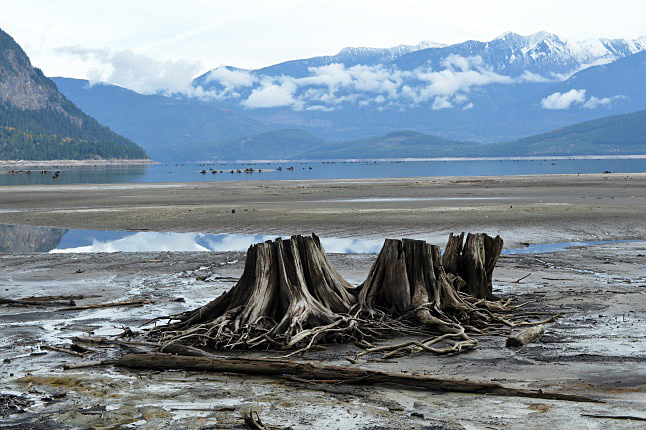
By Laura Stovel
The great Columbia River that runs past Revelstoke all the way to the Pacific Ocean was once much wilder than it is today. The rapids were fierce – and dreaded by indigenous and fur trading canoeists who used this waterway like a highway. In the slower-moving parts of the river, giant sturgeon, known to live longer than 100 years and reach 20 feet in length, combed the depths while, in spring, summer and fall, successive runs of Pacific salmon – chinook, sockeye and coho – fought their way up past Revelstoke to spawn.
In the late 1800s and early 1900s, settlers logged, then farmed, the fertile river banks. At one point more than 200 farms between Revelstoke and Twelve Mile, south of Revelstoke, and several thriving communities all the way to Arrowhead.
All this ended with the damming of the river, especially the construction of the Keenleyside dam near Castlegar in the late 1960s. Hundreds of farmers and residents of places like Arrowhead, Twelve Mile and Mount Cartier were forced to move, their homes had to be moved or burned. “We didn’t want to go,” recalled Walter Bobicki, who was a teenager living in Mount Cartier at the time. BC Hydro “more or less pushed us off the land.”
On March 24th, the North Columbia Environmental Society is organizing an evening of film and speakers at the Revelstoke Performing Arts Centre. The event will highlight the history of the Columbia River, the impact of the damming, the Columbia River Treaty and the ecosystem around the river.
The first of the two half-hour films, the History of the Columbia River Treaty, was produced by Columbia Basin Trust and includes historic interviews with farmers who lost their land.
The second film, Treaty talks: A journey up the Columbia River for people and salmon was created by Xander Demetrios and Adam Wicks-Arshack. It shows a journey up the river in five dug-out canoes carved by youth and describes the efforts by indigenous people who live along the river to bring Pacific salmon back to their historic spawning grounds. The film includes an interview with long-time Revelstoke resident Sam Olynyk whose family farm at Mount Cartier was burned when they were forced off the land.
The films will be followed by a panel of three experts on topics relating to the Columbia River. Loni Parker, director for Rural Revelstoke, Columbia Shuswap Regional District Board, will talk about the Treaty negotiations. Cathy English, curator of the Revelstoke Museum and Archives, will discuss the history of the flooding. And wildlife biologist Ryan Gill of Cooper, Beauchesne and Associates will discuss the ecosystem from a bird and wildlife perspective. The audience will have an opportunity to ask questions following the panel discussion.
The event will be held at 7:00 p.m. on Friday, March 24 at 7 pm at the Revelstoke Performing Arts Centre. It is being held earlier than usual to encourage children and youth to attend.



